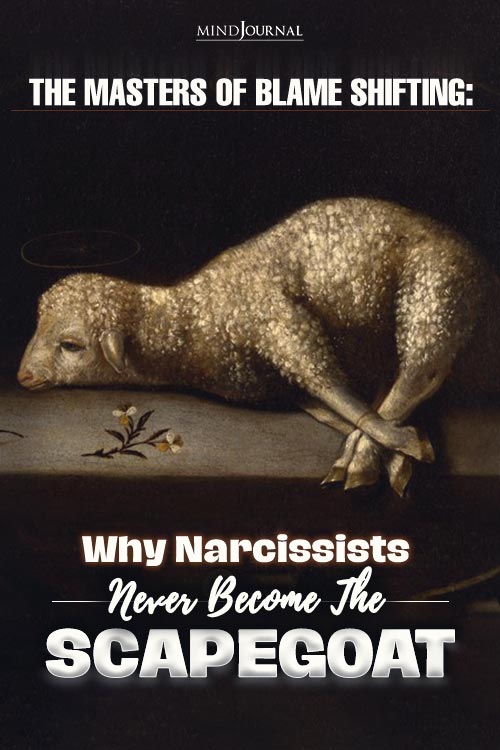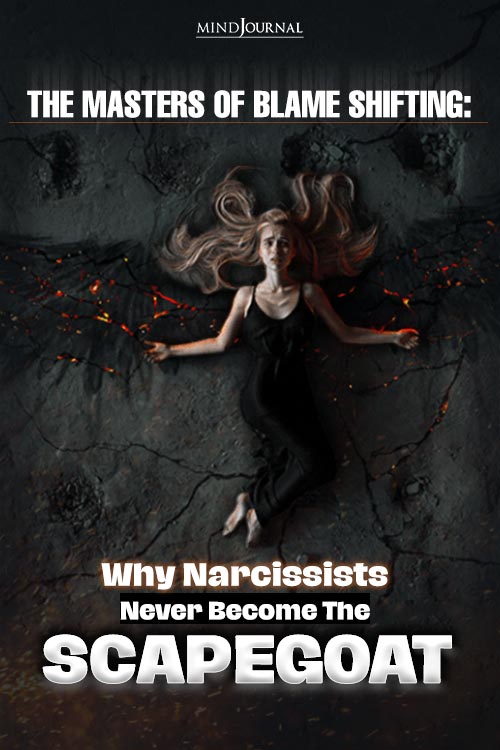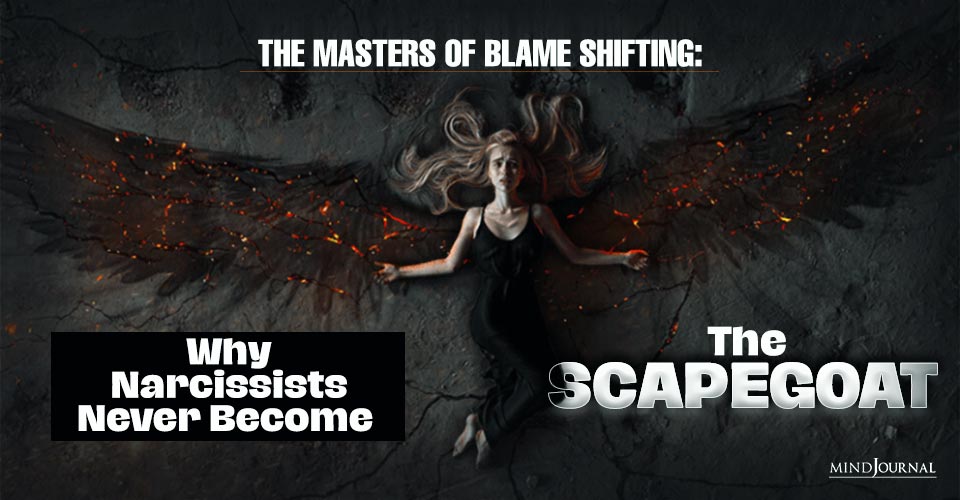I am not at fault. I am not guilty. And I am not to be blamed. For I am the narcissist. You can try your best to put the blame on me and make me the scapegoat. But I am the master of this game and I will put the blame on you before you can even realize what’s going on.
“You don’t want to end up like him do you now?”
Years later those words still echo through my mind. They act as some cruel guardian which ensures that I will never stumble, never flounder and never fall victim to the injustices which this world has in store for me.
I was shown what happens to those who are weak, those who fail to seize control and grasp the power for themselves. The consequences of failure were paraded before me on an almost daily basis to allow me to witness the full horror of what it was to be sub-standard, below par, and just not good enough.
I knew that this fate must not befall me and that it became necessary for me to clamber higher than everybody else no matter what it took or what the cost was. So long as there was somebody underneath me on that ladder as I climbed, then, as the saying goes, the devil would take the hindmost.
Onwards and upwards, climbing higher and higher to escape the consequences of vulnerability, weakness, and failure.
I was given a swift induction into learning how to stay ahead and protect myself. There were two routes available to ensure that you stayed number one and the best. Strive to stay ahead of the opposition and by the opposition, I was taught that this means everybody else and furthermore brings the opposition down so that they become subsumed into the quagmire of failure.

If your opponent is taller, chop him off at the knees. If he is better looking, fling acid in his face. If he is smarter, batter his brains out. If he is stronger, poison him into weakness. If he is wealthier, sap him of penny and cent. If he lives in a pleasant place, pollute the neighborhood. If he has a good job, get him sacked.
Figuratively speaking some of the time of course and that means to do all of those things, that it is necessary to play the scapegoat card. Become proficient at pointing the finger elsewhere, cultivate persuasiveness so that the allocation of the blame falls on the shoulders of another, practice plausible deniability so the mantle of fault never rests on my head. Never be the one at fault. Ever. Those were my instructions.
The indoctrination continued. You are not to blame, you are not guilty, you are not the problem, you did not cause the problem either. Erase sorry from your vocabulary as you do not feel it, remove the idea of apologizing as you have nothing to apologize for, do not express anything which might be regarded as guilt as that is an alien concept.
Read: Blame Shifting: Why The Abuser Blames You Even When You Are The Victim
There is always somebody else who can be blamed. It does not take long for the repeated mantra of it never being my fault to engender that sense of impregnability and a lack of accountability. Since it is the fault of everyone else it is impeccable logic is it not that it can never be my fault? It, therefore, follows that if it is never my fault then such a fault-free individual is truly superior and stands above all others.
To facilitate this it, therefore, becomes necessary to identify a scapegoat or more accurately scapegoats. The role of scapegoat slots seamlessly into our thinking. The fault is an intangible concept but it exists. Someone is always to blame. I was taught that from the beginning.
Things do not just happen, they happen for a reason and the reason that she was always crying, that he was always failing, that they were socially ostracised, that she could not pass her exam, that he never scored a goal, that they never went on holiday, that he could not hold down a job, that she was a single mother, that he had a drinking problem, that she was ugly, that he lived in a poor area, that she was never invited out, that he died alone, that she was beaten, that he was arrested, that she was raped, that he was murdered was because they were scapegoats.
Make others the scapegoat and immunity from fault and blame follow
Thus one can move without hindrance, barrier, or boundary. Make him or her a scapegoat because if you do not get in first they will do it to you.
Make sure you blame them before they can turn that accusing eye in your direction. Stay one, no ten, steps ahead. They deserve to be blamed. If they had any value they would not be stigmatized in such a fashion, it is their own fault.
I learned that they may come with smiles but the blade of blame is held behind their back ready to strike, so plunge your dagger of fault deep into them first. Do not be taken in by the false proclamations of love and compassion, they are but veils to place across my eyes so a crown of accountability can be thrust on my head.
Soon, the lessons that I learned began to automatically teach me. Not feeling enough attention at a party? The guests are ignorant and impolite. Tell one that this is a case and see how the attention shifts. Served slowly at the bar? The barman is incompetent and he should be reminded of this fact. See how he has responded now?
Report not completed on time? Find a junior colleague and point out how he has failed to provide the necessary information. Criticized for not earning enough? Blame the bosses for running the company into the ground and failing to reward an achiever such as I. Feeling restless and unloved? Lash out at her so she seeks to make amends. Stuck in a traffic jam? Blame the department of transport for the ill-thought-out road works.
Read: The Narcissist Blame Game: Why It’s ALWAYS Your Fault?
Struggling to sleep? Must be those damned neighbors and their late-night music, go and give them a piece of your mind and see how much better you feel when you point out they are at fault.
But what if it is not those things and it is because I am not interesting enough to talk to, or not attractive enough to catch the server’s eye, or not good enough at my job, or not hitting the targets because I cannot apply the required effort, or because I do not show her any affection any longer, or because I set off late from the house, or because I fell asleep this afternoon?
Never. That is what they want you to think. That is the control that they seek to exert over you. That is how they get inside your mind and try to make you think that you are weak when you are not.
Remember, they want you to be the scapegoat. They want you to be the failure, they want you to be the subject of their blaming, so you take the rap, take the hit and become the patsy. Yes, you are right, I remember now.
The diktat still resonates even now, reminding and emphasizing. That is not your role. You are better than all of them. You will rise above them and do that you must work hard at everything and ensure that they are the ones who are to blame because they are.
They are the ones who are trying to stop you from achieving and claiming what is rightfully yours. They are the traitors, the insidious foes, the treacherous betrayers who spout sedition and practice disloyalty. Let them know who they are, scapegoat them.
Thus this carries into everything that we do. We find a scapegoat in every aspect of our lives. The put-upon sibling, the browbeaten colleague, the lambasted neighbor, the oddball in the local superstore, the subjugated underling, the butt of the social circle, and most of all you, the intimate partner who becomes the ultimate scapegoat.
It is you that becomes the receptacle for our domineering, hectoring, nagging, bullying, blaming, intimidating, coercing, blaming, accusing, menacing, terrorizing, bludgeoning, and oppressive persecutions.
You burnt dinner, you made the white shirt turn pink, you forgot to get that present that we wanted, you failed to satisfy our sexual appetite, you made us be unfaithful, you made us break that mirror, you made us slap you, you made us ill, you made our team lose, you cost us that promotion, you woke us too early, you woke us too late, you let us fall asleep, you kept us awake, you didn’t do it, you did it. Again.
This conditioning ensured that the only way to stay ahead, to win, and to succeed was to find someone else to blame and that does not change because we know you are just waiting to try to blame us, well we know your game. We have you in our eyes and it is you who is to blame, not us.
The only way to prevent the hell of being a scapegoat is to make others a scapegoat instead. And so I do as I do, I say as I say and I am what I am so that I do not end up like him, like her, like them, like you.
Can you really blame me for doing that?
Written by HG Tudor Originally appeared on Narcsite Republished with permission










Leave a Reply
You must be logged in to post a comment.